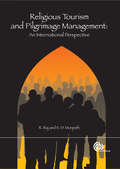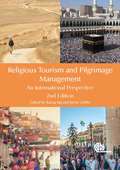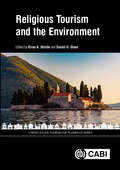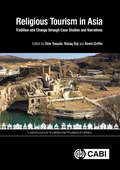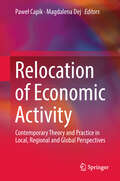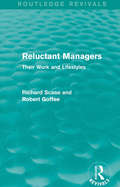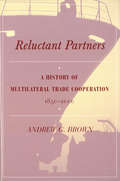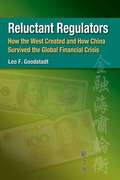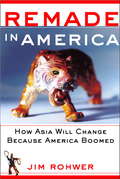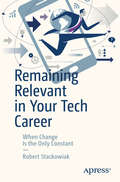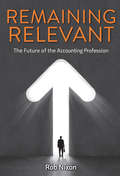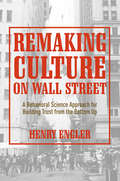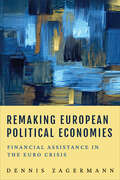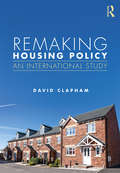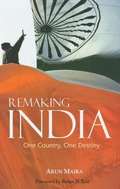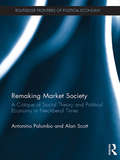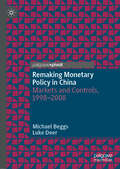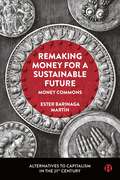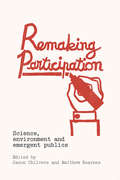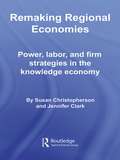- Table View
- List View
Religious Tourism and Pilgrimage Festivals Management: An International Perspective
by Razaq Raj Nigel D. MorpethIn case studies, researchers in tourism from Europe, China, Australia, and Canada present personal, theoretical, and empirical insights into pilgrimage, religion, and tourism. They explore increasing linkages and interconnections between shared sacred and secular spaces; religious and pilgrimage activity related to ancient, sacred, and emerging tourist destinations; and new forms of pilgrimage, faith systems, and quasi-religious activities.
Religious Tourism and Pilgrimage Management: An International Perspective (2nd Edition)
by Razaq Raj Neil Robinson Ian Rotherham Alan Clarke Dr Nour Farra-Haddad Carlos Fernandes Silvia Aulet Vitor Ambrósio Elizabeth Ifeyinwa Benson Nigel Bond Miguel Brázio Geoffrey Skoll Dr Dolors Vidal Ruth Blackwell Hadil Faris Dr Maria Leppakari Michael O’ Regan Yasin Bilim Jorge Coelho Jaeyeon Choe Tahir Rashid Samson Olawale Fadare Sevde Düzgüner Maximiliano Korstanje Lluis Prats Vincent Zamitt Anna Trono Kevin Griffin Agnes RaffayWithin the past 10 years 'Religious Tourism' has seen both economic and education-sector growth on a global scale. This book addresses the central role of religious tourism and interrelationships with other aspects of pilgrimage management. It provides practical applications, models and illustrations and looks at secular and sacred spaces on a global stage. The second edition sees the introduction of a new structure and the addition of new international case studies. It is an invaluable reference for academics, students and practitioners and is a timely text on the future of faith-based tourism and pilgrimage.
Religious Tourism and Pilgrimage Management: An International Perspective (Cabi Religious Tourism And Pilgrimage Ser.)
by Neil Robinson Ian Rotherham Alan Clarke Dr Nour Farra-Haddad Carlos Fernandes Silvia Aulet Vitor Ambrósio Elizabeth Ifeyinwa Benson Nigel Bond Miguel Brázio Geoffrey Skoll Ruth Blackwell Hadil Faris Dr Maria Leppakari Michael O’ Regan Yasin Bilim Jorge Coelho Jaeyeon Choe Tahir Rashid Samson Olawale Fadare Sevde Düzgüner Lluis Prats Vincent Zamitt Agnes Raffay Associate Professor Anna Trono Professor Maximiliano Korstanje Dr Dolors Vidal-CasellasWithin the past 10 years 'Religious Tourism' has seen both economic and education-sector growth on a global scale. This book addresses the central role of religious tourism and interrelationships with other aspects of pilgrimage management. It provides practical applications, models and illustrations and looks at secular and sacred spaces on a global stage. The second edition sees the introduction of a new structure and the addition of new international case studies. It is an invaluable reference for academics, students and practitioners and is a timely text on the future of faith-based tourism and pilgrimage.
Religious Tourism and the Environment (CABI Religious Tourism and Pilgrimage Series)
by Kiran A. Shinde and Daniel H. OlsenThe remarkable growth in religious tourism across the world has generated considerable interest in the impacts of this type of tourism. Focusing here on environmental issues, this book moves beyond the documentation of environmental impacts to examine in greater depth the intersections between religious tourism and the environment. Beginning with an in-depth introduction that highlights the intersections between religion, tourism, and the environment, the book then focuses on the environment as a resource or generator for religious tourism and as a recipient of the impacts of religious tourism. Chapters included discuss such important areas as theological views, environmental responsibility, and host perspectives. Covering as many cultural and environmental regions as possible, this book provides: -An in-depth yet holistic view of the relationships between religious tourism and the environment; -A conceptual framework that goes beyond listing potential environment impacts; -A strong focus on explaining the universality of the deeper environmental issues surrounding sacredness and sacred places; -A discussion of the role of disease and health-related issues at mass religious gatherings. From a global writing team and featuring case studies spanning Europe and Asia, this book will be of great interest to researchers and students of tourism and religious studies, as well as those studying environmental issues.
Religious Tourism in Asia: Tradition and Change through Case Studies and Narratives (CABI Religious Tourism and Pilgrimage Series)
by Razaq Raj Kevin Griffin Dr Shin YasudaThe Asia-Pacific region is considered the world's religious core, with the greatest number of pilgrims and travellers to religious events for both international and domestic tourism. It is estimated that there are approximately 600 million national and international religious and spiritual voyages in the world, of which over half take place in Asia. This book focuses on tourism and sacred sites in Asia. Contemporary case studies of religious and pilgrimage activities provide key learning points and present practical examples from this 'hub' of pilgrimage destinations. They explore ancient, sacred and emerging tourist destinations and new forms of pilgrimage, faith systems and quasi-religious activities. It will be of interest to researchers within religious, cultural, heritage and Asian tourism. Key features include: - An Asian perspective on a growing area of tourism. - Case studies from across the continent. - Full-colour images of pilgrimage sites and key destinations bring the topic to life.
Religious Tourism in Asia: Tradition and Change through Case Studies and Narratives (CABI Religious Tourism and Pilgrimage Series)
by Razaq Raj Kevin Griffin Shin YasudaThe Asia-Pacific region is considered the world's religious core, with the greatest number of pilgrims and travellers to religious events for both international and domestic tourism. It is estimated that there are approximately 600 million national and international religious and spiritual voyages in the world, of which over half take place in Asia. This book focuses on tourism and sacred sites in Asia. Contemporary case studies of religious and pilgrimage activities provide key learning points and present practical examples from this 'hub' of pilgrimage destinations. They explore ancient, sacred and emerging tourist destinations and new forms of pilgrimage, faith systems and quasi-religious activities. It will be of interest to researchers within religious, cultural, heritage and Asian tourism. Key features include: - An Asian perspective on a growing area of tourism. - Case studies from across the continent. - Full-colour images of pilgrimage sites and key destinations bring the topic to life.
Relocation of Economic Activity: Contemporary Theory and Practice in Local, Regional and Global Perspectives
by Paweł Capik Magdalena DejThis timely volume provides a thorough analysis of current trends in location and relocation of economic activity globally, regionally and locally. Using robust empirical material this book offers a multidisciplinary, comprehensive overview, critique and extension of long-established theories underpinning patterns of firm (re)location. It explores dominant trends in the mobility and relocation of industries and firms, examines the factors guiding such trends and evaluates their consequences in both developed and emerging economies in Europe, Asia and Latin America.This book will be appreciated by diverse audiences. Geography and regional science researchers of ‘economic activity location’ can engage with the critical appraisal of key theoretical concepts and an analysis of recent empirical data. Students of human and economic geography, planning, regional development, and global supply chain management in senior years of undergraduate programmes and completing postgraduate degrees will appreciate the accessible language, multiple examples and graphical illustrations of theoretical frameworks underpinning location and relocation of firms and industries, and its consequences. Practitioners, including local and regional policy makers and location consultants will enjoy the comparative discussion of solutions and practices adopted in localities, regions and countries as diverse as China, Brazil, The Netherlands and Poland.
Reluctant Managers: Their Work and Lifestyles (Routledge Revivals)
by Robert Goffee Richard Scase‘The manager’ is a crucial figure in debates about the future of the British economy in general and the working practices of private and public organizations in particular. He or she is to be encouraged, cajoled, exhorted or at worst obliged to pursue organizational goals of greater economy, efficiency and effectiveness. Richard Scase and Robert Goffee examine the lives of managers in this study, first published in 1989. The information in the book comes from in-depth interviews with men and women in both private and public sector organizations. The authors also explore managers’ feelings towards their work and home lives, and where their strongest alliances lie. The book reveals that, under increasing pressures at work and changing expectations at home, managers are fundamentally reluctant to fulfil the committed entrepreneurial roles that many optimistically have been allocating to them. This book is ideal for students of business and management.
Reluctant Partners
by Andrew G. BrownWith globalization drawing countries closer together, greater international cooperation is essential for peace and stability. The collective arrangement made by governments to manage their trade relations is one of the few successes of globalization. This book assesses the progress of multilateral trade cooperation, exploring the interests at work and the issues raised in successive postwar rounds of negotiations. It traces how the narrow perception of reciprocity has gradually yielded to a broader evaluation of the benefits to the regime as a whole as the major trading nations have mutually reduced trade barriers. Andrew G. Brown demonstrates the increasing importance of rule making and shows the diversity of issues on which negotiations have focused, such as customs procedures, technical standards, subsidies, anti-dumping duties, intellectual property rights, and the treatment of foreign direct investment. Despite the progress, however, the regime has remained vulnerable. The book also analyzes the major sources of strain that have been evident. This is a nontechnical book for those curious about the possibilities for cooperation among states and should be of interest to both the nonspecialist and the specialist. It draws on more than one discipline to interpret the events, lying in the triangle bounded by political science, economics, and history.
Reluctant Regulators
by Leo F. GoodstadtIn a work partially funded by the Hong Kong Institute for Monetary Research, Goodstadt explores why American and British financial officials were reluctant to intervene when confronted with evidence that their financial stability was in danger. Four case studies describe China's experiences during the 1997-1998 Asian financial crisis, the impact of the recent global financial crisis on the Chinese banking industry, and Beijing's use of Hong Kong as a force for modernizing its major banks and corporate practices. Distributed in the U. S. by the U. of Washington Press. Annotation ©2011 Book News, Inc. , Portland, OR (booknews. com)
Remade in America
by Jim RohwerIn a stunning rebuke to a large group of naysayers, Jim Rohwer convincingly argues that the Asian financial crisis of 1997-1998 was not a turn for the worse; rather it was short-lived and helped rid Asian markets of many of the problems that were holding it back. Now, while most analysts go wild over the American economy, Rohwer provides the key insights into why America is due for a slowdown while Asia is poised for tremendous growth and opportunity. Jim Rohwer has long experience in Asia as both a journalist and a business executive. The highly informed account in Remade in America comes from his own on-the-ground observation and analysis, as well as knowing all the major players in business, government, and the media in both America and Asia. Telling, in-depth interviews with people ranging from Lee Kuan Yew, the former prime minister of Singapore, and Jack Welch, the CEO of General Electric, result in deep insights into Asia's great potential.The future of Asia is as much about the United States as it is about Asia, for the forces that revolutionized the American economy in the last twenty years provide the clues for what is to come in Asia. The key to Asian growth is understanding how Asian companies have learned from the strengths of both American and Asian business models. Remade in America clearly charts how Asian industries have started managing themselves based on American standards of corporate, technological, and economic performance that began to be adopted in the late 1990s, while incorporating their own strengths of cooperative corporate and social organization. Asia is ideally suited to take advantage of the Internet revolution, and we are only now starting to see its enormous potential in this area. Rohwer's insightful analysis of Japan, China, Taiwan, South Korea, and Southeast Asia shows how, as these countries start to combine the ruthlessly efficient market democracy and accountability that America pioneered with the Asian domination of dispersed manufacturing and assembly of components, there will be major opportunities both for American corporations and for investors. In addition, technology will not only enable Asian economies to improve on their traditional strengths, it will also help Asia greatly improve its traditional poor performance in services and distribution.Remade in America is a provocative and useful book, not only for those with direct business interests in Asia but also for readers who want an informed look at this dynamic and important part of the world. There will be a new Asia, Inc., one in which such matters as finance and technology will be handled in an American way while people will be managed along Asian lines in their interactions -- a powerful combination that we ignore at our peril.
Remain Authentic--but Conform Enough: How to Be a More Effective Leader
by Gareth Jones Rob GoffeeLeaders who succeed in changing organizations challenge the norms--but rarely all of them, all at once. This chapter focuses on reading organizational context and understanding the complex social architecture to which the leader must adapt in order to gain traction in an organization.
Remaining Relevant in Your Tech Career: Navigating Over A Lifetime Of Constant Change
by Robert StackowiakRemain relevant in the face of constant change during your career in technology. This book shows you how to proactively plan in anticipation of future changes. Many people find technology careers enticing because of the number of job opportunities, the high compensation, or simply because of fascination with technology itself. Once in those careers, however, there are many challenges to remaining relevant and at one’s peak in the face of constantly shifting competitive and technology landscapes. Incumbents face a constant stream of new skills to learn that are often already known by more recent graduates entering the market at lower compensation rates. There also are time-to-market challenges and the need to keep up with the introduction of automation.This book was written based on the author’s experience gained over 40 years working with and in technology-related fields and companies. It provides practical guidance on remaining relevant as changes are expected to occur in technology at ever faster rates in coming decades.What You'll LearnKnow what companies really wantRealize the importance of alignment with company cultureUnderstand the political landscape and how to use it to advantageDiscover why creating, maintaining, and operating in a diverse environment is beneficialMaster strategies for skills developmentFuture-proof your careerWho This Book Is ForTechnology professionals who want to remain relevant and happy while navigating their current career and university students who are pursuing a STEM career and actively planning their future
Remaining Relevant: The Future of the Accounting Profession
by Rob Nixon'Remaining Relevant' is practical and practiced advice for accountants to remain relevant in a 'disrupted' industry and has been described as "the most important business book that you will read this year." Anthony S Bongiorno, The Bongiorno Group. The explosion of cloud computing and its impact on the accounting industry is the impetus for 'Remaining Relevant', which is all about the future of the accounting profession - essential reading in this manual for an accountant's success. "Technology is enabling and will demand the accounting profession to transform. From the changing the engagement and service mix within a firm, to fixed fee billing and off shoring ... everything is up for review. As long-term industry insider and visionary, Rob has the unique capability to help accountants focus on what is important through his direct, and at times confronting, analysis of the profession. A must read." Tim Reed, MYOB CEO "Rob Nixon is to accounting what Peter Drucker was to strategy: He creates new paradigms and fresh approaches to a discipline that would be headed for the doldrums without him." Alan Weiss, PhD, Author, Million Dollar Consulting Rhode Island, USA "The accounting game is changing forever. Any partner who doesn't acknowledge this is kidding themselves. The age of the dinosaur firm is coming to an end, and this book is a must for any accountant who wants to remain relevant in the 21st Century." Chris Hooper, CEO, Accodex Adelaide, Australia
Remaking Culture on Wall Street: A Behavioral Science Approach for Building Trust from the Bottom Up
by Henry EnglerSince 2008, financial firms have paid, in aggregate, in excess of $320 billion in fines related to misconduct. Nearly ten years later, while many large financial firms have increased their attention to bad behavior and cultural drivers, the degree of commitment and progress in these efforts has not been even across the industry. Serious or persistent misconduct continues in some firms. Many organizations have attempted to curb bad behavior through intrusive monitoring and enforcement actions which reflect a lack of trust in their employees. A different approach is needed, one that gets at the root causes of misconduct and attempts to rebuild culture from the bottom up, with the employee at the center. This is where tools from behavioral science can help senior risk officers, compliance and business heads better understand the mind-set of their employees and internal communities and create an environment where the link between ethical behavior and strong business results is promoted. If firms continue to fail in establishing stronger internal cultures, regulators may feel compelled to step in and dictate what they should do. This book emphasizes the need for a change in approach, looking at the increased incidence of misconduct and culture breakdown since the 2008 crisis, how regulators have responded, and includes a series of proposals to restore that trust and reform culture.
Remaking European Political Economies: Financial Assistance in the Euro Crisis (European Union Studies)
by Dennis ZagermannFrom 2009 to 2015, the euro area of the European Union (EU) experienced an existential socio-economic crisis. To secure its institutional integrity, the EU designed several new institutions to support member states in need but also to facilitate socio-economic adjustments. The European Stability Mechanism (ESM) lies at the centre of this strategy: it provides financial assistance to member states in severe crisis on an intergovernmental basis while demanding compliance with adjustment programs from program countries. Based on a comparative political economic analysis, Remaking European Political Economies shows that the EU’s financial assistance programs focused strongly on reforms that led to a partial convergence of program countries based on market-based economic governance and reduced governmental influence in the economy. The book draws on extensive, empirically based case studies of two prominent euro area countries in crisis: Greece and Ireland. Dennis Zagermann illustrates that socio-economic models in the euro area can experience institutional change if exposed to severe crises in combination with financial assistance programs that include policy conditionality. In doing so, his book sheds light on the central question of whether there is a possible convergence of European models of capitalism – a question that has been at the centre of comparative political economic debates for over thirty years.
Remaking Housing Policy: An International Study
by David ClaphamBreaking the country-specific boundaries of traditional housing policy books, Remaking Housing Policy is the first introductory housing policy textbook designed to be used by students all around the world. Starting from first principles, readers are guided through the objectives behind government housing policy interventions, the tools and mechanisms deployed and the outcomes of the policy decisions. A range of international case studies from Europe, Asia, Africa and the Americas illustrate the book’s general principles and demonstrate how different regimes influence policy. The rise of the neo-classical discourse of market primacy in housing has left many countries with an inappropriate mix of state and market processes with major interventions that do not achieve what they were intended to do. Remaking Housing Policy goes back to basics to show what works and what doesn’t and how policy can be improved for the future. Remaking Housing Policy provides readers with a comprehensive introduction to the objectives and mechanisms of social housing. This innovative international textbook will be suitable for academics, housing students and those on related courses across geography, planning, property and urban studies.
Remaking India
by Arun MairaRemaking India is an impassioned critique of India's current economic and social situation and argues for a better way to create inclusive development and growth. Arun Maira, one of India's leading business consultants and thinkers, applies the principles of `scenario thinking` and the `learning field` to identify some key obstacles to India`s holistic growth. Deftly weaving memoir with history, this book discusses India`s journey from its birth as a nation, to its more recent liberalized phase. The author examines a broad canvas of concerns, and emphasizes that unless India`s growth percolates to its poor and underprivileged we will have a divided and unequal society and nation. He highlights some key steps that are needed to put India on the appropriate growth trajectory. He stresses that businesses must look beyond profits and emphasizes the critical need for collaboration between business and government for nation building, and, presents a conceptual roadmap for India`s future, suited to its diverse social, economic and cultural needs.
Remaking Market Society: A Critique of Social Theory and Political Economy in Neoliberal Times (Routledge Frontiers of Political Economy)
by Alan Scott Antonino PalumboNeoliberalism has been one of the most hotly contested themes in academic and political debate over the last 30 years. Given the global and persistent influence of neoliberal ideas on contemporary styles of governance, social-service provision, and public policy, this intensive interest is understandable. At the same time, the use of the term has become loose, vague, and over-extended, particularly in the extensive critical literature. Rather than engage in further critique, or in the reconstruction of the history of neoliberalism, this volume seeks to bring analytical clarity to the ongoing debate. Drawing inspiration from the work of the Hungarian economic historian, Karl Polanyi, Remaking Market Society combines critique, original formulations, and case studies to form an analytical framework that identifies the key instruments of neoliberal governance. These include privatization, marketization, and liberalization. The case studies examine the development of neoliberal instruments (reform of the British civil service); their refinement (reform of higher education in England and Wales); and their dissemination across national borders (EU integration policies). Rather than look back nostalgically on the post-war welfare-state settlement, in the final chapter the authors ask why the coalitions that supported that settlement broke down in the face of the neoliberal reform movement. This highly original work offers a distinctive transdisciplinary approach to political economy, and therefore is an important read for students and academics who are interested in political economy as well as social theory and political philosophy.
Remaking Monetary Policy in China: Markets and Controls, 1998–2008
by Michael Beggs Luke DeerThis book covers the recent history of Chinese monetary policy. While most current work focuses on This book traces and explains the evolution of Chinese monetary policy in the years before 2008. The turn towards interest rate deregulation and market-oriented policy in China in recent years is often seen as a break with former command-and-control policy norms, in favour of Western central banking norms. We argue that Chinese monetary policy already went through a transformation under the influence of ‘new consensus’ macroeconomics after 1998, but that this surprisingly led to increased reliance on direct banking controls in the 2000s. Therefore, many of the controls that look to many like a remnant of central planning are in fact an outcome of an earlier attempt to ‘rationalise’ monetary policy, in unusual Chinese conditions. Specifically, policy returned to direct controls because of an underdeveloped interbank money market, and a glut of bank liquidity associated with enormous foreign exchange inflows in the mid-2000s.
Remaking Money for a Sustainable Future: Money Commons (Alternatives to Capitalism in the 21st Century)
by Ester Barinaga MartínEngaging imaginatively with the future of money, this accessible book examines the real-life efforts of grassroots movements and activists from across the world who are reclaiming power by designing, organising and implementing complementary currencies. This book will be of interest to all who are interested in constructing a more sustainable and just world.
Remaking Ourselves, Enterprise and Society: An Indian Approach to Human Values in Management (Transformation and Innovation)
by G.P. RaoDecision makers interested in going beyond their own personal and professional interests and involving themselves in humanising their organization, community and society should read Remaking Ourselves, Enterprise and Society. This book is about adherence to human values at an institutional level, and its starting point is the belief that human beings have basic goodness, which in turn is reflected in the desire to be of help to others and to do good. Professor Rao introduces the Indian concept of 'Spandan' (Heartbeat). Spandan is operationalized through a process of diagnosis, discovery and development enabling organizations to achieve an optimal balance between what are defined as transactional, transformational, and terminal human values. This leads to management and organizations developing sensitivity to the needs of others, which they come to understand. When such sensitivity becomes integral to its work ethic and culture, an organization is able to temper its commitment to task with humanity and it becomes functionally humane. Experience suggests, not surprisingly, that organizations that can achieve this optimal balance between results and relations achieve higher employee commitment and productivity and increased accommodative spirit that better equips them to deal with difficult times. This exciting addition to Gower's Transformation and Innovation Series will enlighten business leaders, governmental and non-governmental policy makers, management educators, organization developers, and researchers.
Remaking Participation: Science, Environment and Emergent Publics
by Matthew Kearnes Jason ChilversChanging relations between science and democracy – and controversies over issues such as climate change, energy transitions, genetically modified organisms and smart technologies – have led to a rapid rise in new forms of public participation and citizen engagement. While most existing approaches adopt fixed meanings of ‘participation’ and are consumed by questions of method or critiquing the possible limits of democratic engagement, this book offers new insights that rethink public engagements with science, innovation and environmental issues as diverse, emergent and in the making. Bringing together leading scholars on science and democracy, working between science and technology studies, political theory, geography, sociology and anthropology, the volume develops relational and co-productionist approaches to studying and intervening in spaces of participation. New empirical insights into the making, construction, circulation and effects of participation across cultures are illustrated through examples ranging from climate change and energy to nanotechnology and mundane technologies, from institutionalised deliberative processes to citizen-led innovation and activism, and from the global north to global south. This new way of seeing participation in science and democracy opens up alternative paths for reconfiguring and remaking participation in more experimental, reflexive, anticipatory and responsible ways. This ground-breaking book is essential reading for scholars and students of participation across the critical social sciences and beyond, as well as those seeking to build more transformative participatory practices.
Remaking Regional Economies: Power, Labor, and Firm Strategies in the Knowledge Economy (Routledge Studies in Economic Geography)
by Jennifer Clark Susan ChristophersonSince the early 1980s, the region has been central to thinking about the emerging character of the global economy. In fields as diverse as business management, industrial relations, economic geography, sociology, and planning, the regional scale has emerged as an organizing concept for interpretations of economic change. This book is both a critique of the "new regionalism" and a return to the "regional question," including all of its concerns with equity and uneven development. It will challenge researchers and students to consider the region as a central scale of action in the global economy. At the core of the book are case studies of two industries that rely on skilled, innovative, and flexible workers - the optics and imaging industry and the film and television industry. Combined with this is a discussion of the regions that constitute their production centers. The authors’ intensive research on photonics and entertainment media firms, both large and small, leads them to question some basic assumptions behind the new regionalism and to develop an alternative framework for understanding regional economic development policy. Finally, there is a re-examination of what the regional question means for the concept of the learning region. This book draws on the rich contemporary literature on the region but also addresses theoretical questions that preceded "the new regionalism." It will contribute to teaching and research in a range of social science disciplines.
Remaking Singapore
by Michael E. Porter Christian H.M. Ketels Boon Siong NeoLooking through the lenses of both macro and micro economic policy, this case examines how Singapore has achieved such stellar success throughout its history, from independence through 2008. The case discusses the different policy choices the Singaporean government has made as well as how the government's structure has aided development.
